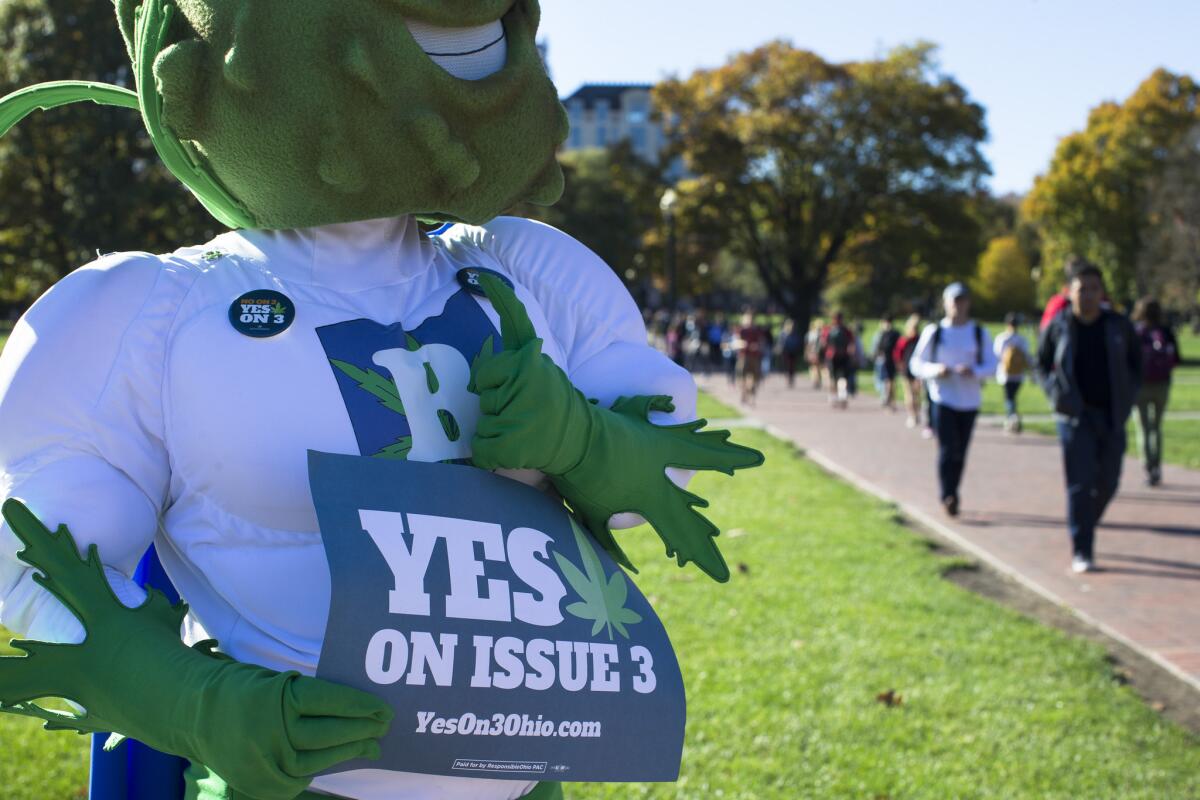Ohio voters soundly reject marijuana legalization initiative

Buddie, the mascot for the pro-marijuana legalization group ResponsibleOhio, holds a sign at Ohio State University in Columbus on election day.
- Share via
Ohio voters soundly rejected a marijuana initiative Tuesday that would have legalized recreational and medicinal use of the drug, and would have limited commercial growing to a small group of investors who drafted and promoted the measure.
The initiative was failing 65% to 35%, with nearly 90% of precincts reporting.
“Issue 3 has been soundly defeated!” Ohioans Against Marijuana Monopolies crowed on Twitter. “No marijuana monopolies in this state!”
Four other states and the District of Columbia have already legalized the recreational sale of marijuana, which is still a federal crime. Ohio would have been the first state in the Midwest to do so.
But along with opposition from anti-drug groups and state elected officials, Ohio’s unorthodox initiative drew discomfort from some legalization supporters.
“This year’s initiative failed because a greed-driven monopoly plan is wrong for the state of Ohio,” one competing pro-legalization group, Legalize Ohio 2016, said in a statement. “Some activists were let down tonight because they put their faith in a bad plan, but their efforts have brought us a step closer to legalizing marijuana in 2016.”
Opponents alleged that Issue 3 would have effectively set up a monopoly by limiting commercial marijuana growth to 10 preselected plots of land owned by the entrepreneurs behind the measure.
A group of 24 investors backing the measure included former NBA star Oscar Robertson, former boy-band celebrity Nick Lachey, and descendants of President William Howard Taft.
The “ResponsibleOhio” legalization campaign was driven by political consultant Ian James, who acknowledged he would profit from the measure.
“The honest and most easy response is: I am going to profit from this,” James told the Center for Public Integrity in June. “If people are upset about me making money, I don’t know what to say other than that that’s part of the American process. To win and make this kind of change for social justice, it does cost a lot of money.”
In a televised concession speech Tuesday night, James called the loss “a bump in the road” and accused state legislators of “refus[ing] to deal with the voters.”
State legislators seeking to derail Issue 3 had presented voters with an “anti-monopoly” initiative, Issue 2, designed to nullify the marijuana initiative and ban special-interest groups from creating constitutional amendments for financial gain.
That anti-monopoly initiative was leading, 52% to 48%.
Both measures appeared on the ballot Tuesday, presenting a potential legal conundrum if both were to pass.
Generally, under Ohio law, whichever ballot measure receives more votes prevails.
But Ohio Secretary of State Jon Husted, who opposed the legalization effort, said that if both measures had passed, the legislators’ anti-monopoly initiative would have prevailed because it would go into effect immediately, while the voter-initiated marijuana measure would take 30 days.
In that case, experts expected the marijuana-initiative supporters to take the matter to court.
The vote for the anti-monopoly initiative was much closer. It was leading, 52% to 48%, with 76% of precincts reporting.
The defeat of the marijuana measure was the first such loss for a recreational legalization initiative since 2012, and the first loss for marijuana advocates more generally since Florida rejected medical marijuana last year, according to John Hudak, a fellow with the Brookings Institute.
“The forces of defeat had more to do with timing, referendum language, demographics, and other ballot initiatives than it did with public opinion on the issue,” Hudak wrote in an instant analysis of the measure’s defeat.
Hudak added that ResponsibleOhio was “never able to consolidate the marijuana reform community inside or outside Ohio, and the ballot measure’s fate was dramatically affected by it.”
In a statement after the vote, Tom Angell of the pro-legalization group the Marijuana Majority called Issue 3 a “flawed measure” that “didn’t represent what voters wanted.”
“Tonight’s results — and the choices that inevitably led up to them — are especially sad for Ohioans who use marijuana and will continue to be treated like criminals for no good reason,” Angell wrote.
On Twitter, Angell also scolded the measure’s backers using the hashtag #HowNotToLegalizeMarijuana. In another tweet, he said, “You idiots.”
Issue 3 also aimed to establish a marijuana control commission to regulate growth, distribution and sales in the state.
The measure would have imposed a 15% tax on gross revenues of growing operations and a 5% tax on gross revenues of retail marijuana stores, plus annual licensing fees.
Fifty-five percent of the taxes would have been distributed to cities and townships and 30% to counties for infrastructure and public safety purposes. The remaining 15% would have gone to the marijuana commission.
Follow @MattDPearce for national news
ALSO
Houston voters reject LGBT equal rights measure
Airbnb measure trailing in early S.F. ballot results
Taco Bell executive charged in attack on Uber driver
More to Read
Sign up for Essential California
The most important California stories and recommendations in your inbox every morning.
You may occasionally receive promotional content from the Los Angeles Times.











